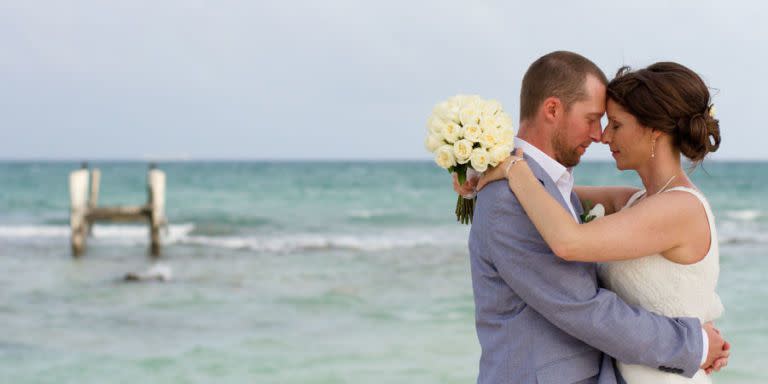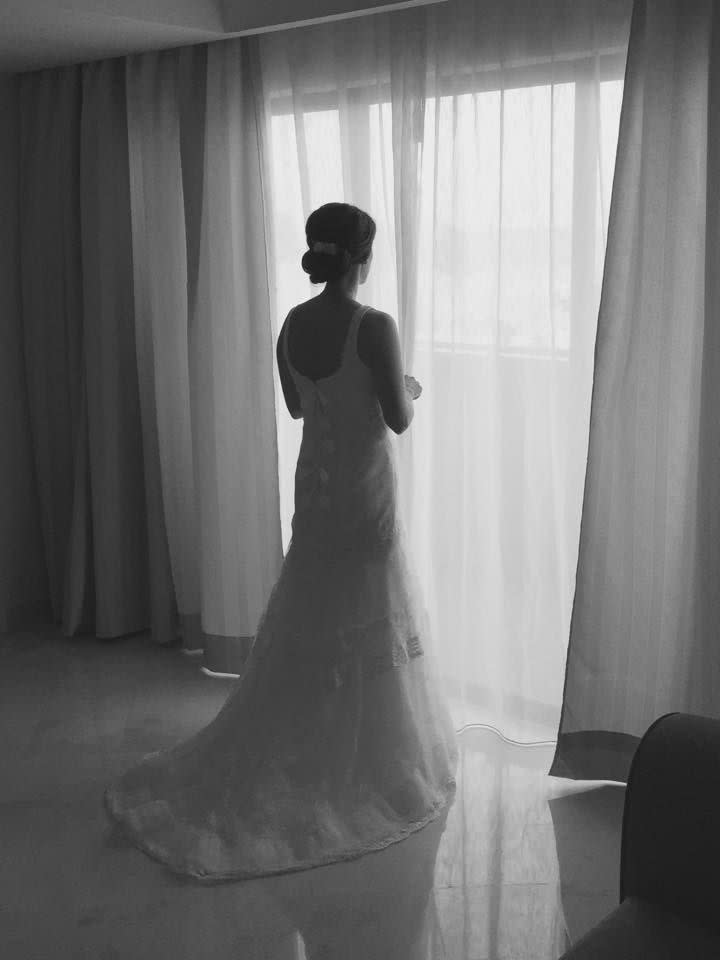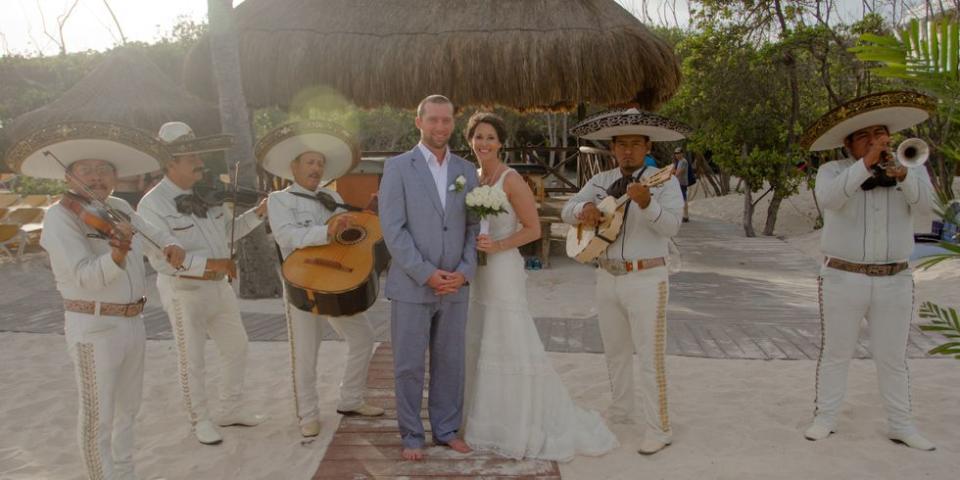'I Had a Heart Attack on the Way to My Wedding'

Sara Hoffman was just 37 when she had a terrifying incident while trapped on a plane en route to her wedding in Mexico. Read her story and find out what she wants all women to know about taking care of their hearts.
On April 13, 2015, I was on a non-stop flight from Seattle to Cancun, heading to my destination wedding in Mexico. (My husband, Court, and I got engaged in February 2014 and had been planning the sunny beach wedding for a little over a year.)
About four hours into the flight we got up to go to the bathroom. As we walked down the aisle to go back to our seats, I started having a very intense burning in the upper part of my chest. My left arm started aching and it felt like I had vice grips on my jaw. A heart attack crossed my mind because I was experiencing the symptoms you often hear about. But I was young and healthy and I wasn't worried about my heart. I told myself, "Don't go to the worst case scenario - you're on an airplane."
I told my husband to get my mom who was on the flight too. She used to work in the medical field so she instantly got a flight attendant after I told her my symptoms. My mom said, "I think you need to see if there's a doctor on the plane." Amazingly, there was a cardiologist on board.
He asked the flight attendant to give me aspirin and nitroglycerin pills (apparently they keep both of these on planes ) and put me on oxygen. He tried to take my blood pressure but was having a hard time hearing it. He called into a medical center on the ground as he monitored me.
After about 20 minutes, I could hear the staff and doctor start to talk about where we were in the flight path. We had just started flying over the Gulf. The attendant said, "If we're going to land, we need to turn the plane around right now." The flight attendant looked at me and waited for an answer. I responded: "You need to land the plane. I know something is wrong."
We made an emergency landing in Louisiana. I knew people were going to think I was just having a panic attack; everyone saw me getting on the plane with my wedding dress. And I didn't look like someone who was having a serious health problem. I figured people were going to make the assumption that nothing is wrong and that I was a bride having the worst case of cold feet ever. But something in my gut said that this was serious.
I was wheeled off the plane and into a waiting ambulance on the runway. We were about seven minutes from the hospital in Kenner, LA. Once there, I was taken into the ER and there were probably 10 to 15 people in the room, taking my clothes off, hooking me up to monitors and taking blood. It was chaos.
At that point, no one had said, you're having a heart attack. I didn't fully realize how bad the situation was until the cardiologist came in and said, "I need you to sign a consent form for an angioplasty."
I panicked and asked "what for?" He said, "You're having a heart attack." Hearing someone confirm my worst fear was incredibly intense.

Within 15 minutes of being in the ER, I was taken into the cath lab. I had an angioplasty and a stent put into my left anterior descending artery, which is also known as the widow-maker. My heart stopped twice during the procedure so I had to be defibrillated. (The doctor told us later that if we hadn't landed, I would have died on the plane that day.)
After we were in Louisiana for two days post-procedure, the doctor said my heart was pumping better and stronger than it was before the incident. My artery was 100% blocked or pretty close to it, so now, there was no reason not to continue on to our wedding. I definitely thought "Should we just cancel the whole thing?" but the doctors didn't say that was necessary.
Next, we flew from Louisiana to Houston. I was not feeling well in Houston and asked for a medic in the airport. He checked my vitals and didn't see anything wrong. As we were about to get on the plane again to fly from Houston to Cancun, we stood at the gate and I thought, "I don't know if I can get on the plane." I didn't want to feel trapped on the plane again. But we eventually boarded and made it to Mexico.
We were there for five days. I was extremely nauseous the whole time and barely ate. I was lightheaded and short of breath. On my wedding day, I did the best I could. I danced with my husband for the first dance but I couldn't enjoy the reception the way I would if I was healthy. On the other hand, I felt so lucky just to be alive that it didn't really matter.
I was happy to get to walk down the aisle and to get married in front of our friends and family. I tried to really enjoy the day and be present, especially given what happened. Everyone says that your wedding day goes by in such a flash. Prior to walking down the aisle, I took a breath and soaked it all in. We had about 50 people at the wedding and everyone knew about the heart attack. (Our guests were told to wait to get on their flights to Mexico until they'd heard from us to say that we were cleared to fly.)
We ended up not going on our honeymoon and came home about five days early because I didn't feel well. The day after we got home, I was back in the hospital for three more days. I had lost 12 pounds since the heart attack and was experiencing congestive heart failure and really bad side effects from my medications.
After a number of much-needed medication adjustments - the doctors said treatment was going to be trial and error since I was young and female and not a "typical" heart attack patient - I started feeling better. I wasn't lightheaded and had more energy.
I then started a six-month stint in cardiac rehab. Two months into rehab, I was running on the treadmill and getting back to being active. I never would have done that on my own. In the beginning, I was angry about my situation. The first day I walked into cardiac rehab, everyone was over 60. I was in tears thinking "How did I end up here?" I realized that all the good choices I made ahead of time were why I was able to recover so quickly.
Now, I go to the gym and swim and do weights. I see a lot more muscle tone in my body that I didn't have before. My husband and I don't eat out very often. We shop the perimeter of the store, focusing on fresh fruit and whole grains and nothing out of a box or can. I actually feel a lot stronger than I did before my heart attack.
When I look at wedding pictures, I feel a mix of emotions. Part of me thinks of it fondly because I got married! But I also relive the story in my head and how sick I felt. You have this image in your head of your wedding day. You picture getting your hair done with your girlfriends and drinking champagne. (I was so nauseous that I wanted to throw up during my hair styling.) I feel some disappointment because I didn't get to have the wedding I spent a year planning.

After a heart attack, everything changes. I have a chronic health condition now. It's not a disease that was cured. It's something I think about every day. I'll be on multiple medications for the rest of my life.
But, more importantly, I also feel like I was given a second chance at life. I'm trying to embrace that fact and be thankful for what I do have. And here's what I want all women to know:
Speak up for yourself
So many women have symptoms and are too embarrassed to go to the ER if it turns out nothing is wrong. Well, I asked someone to land an entire airplane for me not knowing if something was really wrong. It's your life and you have one chance at it. If you're wrong, you're wrong, and the ER sends you home. But what if you're right? You have to trust your instincts.
Understand your family history
Before my heart attack, I wasn't worried about heart disease. I do have a family history (my dad had a heart attack at 36 and my grandfather had one at 40), but I thought I was in the clear. I'd run a marathon and many half marathons. I ate healthy. I didn't smoke. I was a vegetarian. I thought all my healthy choices would counteract the family history. It's so important to schedule a well-woman visit and discuss what family history means for your risk (don't just check the box on the form!). I know now that genetics are really powerful and I volunteer as an advocate for the American Heart Association's You're the Cure initiative.
('You Might Also Like',)

